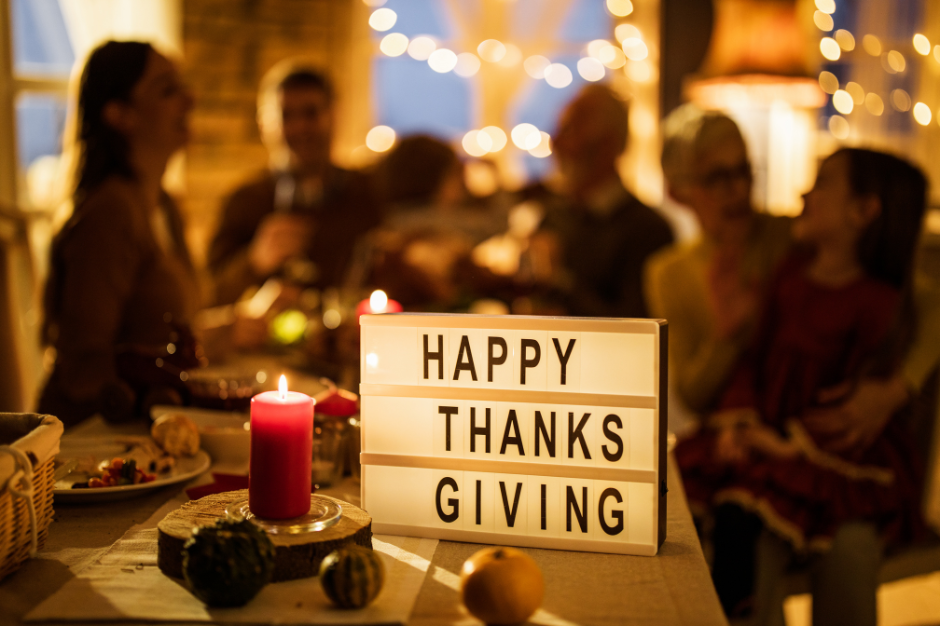Thanksgiving is nearly here. Gratitude, gravy, and gathering with loved ones is on many people’s minds. But, for some, holidays with family can be challenging. Complicated relationships, anxiety, unreasonable expectations, and trauma can influence our experience. Even still, the desire to participate in the festivities can be strong. To make the experience positive, we’ll explore six strategies for surviving Thanksgiving 2023 while keeping emotional health intact.
Identify Triggers
Triggers cause strong negative emotional responses to situations, people, and things that distress us. These feelings go beyond mild annoyance. In a triggered state, we feel panicked, trapped, and helpless. People who’ve experienced trauma may have flashbacks of the traumatic event or feel like they’re reliving it. E.g. If we grew up with a parent who verbally abused us, we may feel like a frightened child when they yell or say certain words. We might feel the strong urge to hide, lash out, or shut down.
Understanding our triggers is the first step to managing our emotions during Thanksgiving gatherings. To do this, we can think about past experiences and identify specific situations and behaviors that cause distress. Then, we can list these events and explore how and why they negatively affect us.
Sometimes, our triggers might not be obvious to us. We may even struggle to recall past experiences. A situation may cause panic or fear, and we might not understand why or recognize that it’s happening. Working with a licensed therapist, like those available through the 24-Hour Counseling Hotline for UCA members, can help us explore our triggers safely.
Set Boundaries
Strong boundaries help us protect our emotional and physical health in every aspect of life. They help us assert what behaviors and interactions we’ll accept or not. Setting boundaries can be uncomfortable, especially if we’re not used to it. We may feel guilty or confrontational, which is completely normal.
When communicating our boundaries, we should be firm but not mean. Boundaries can be expressed in advance to set expectations. Or we can set them in the moment if someone has crossed the line.
E.g.,
Before: “Please don’t insult my career at dinner tonight. If you do, I’ll have to leave.”
During: “Please stop commenting on my weight. If you don’t, I’ll end this conversation.”
Setting boundaries ensures we respect and communicate our needs effectively and keep ourselves safe.
Plan Responses
Good planning is crucial for the success of most things, including navigating family Thanksgiving. We should consider which triggers and uncomfortable questions might arise and prepare our responses accordingly.
For example, if our nosy cousin keeps pestering us about when we’ll have children, we can say, “I appreciate your interest, but I don’t want to talk about this right now.”
For triggers, coping skills like deep breathing, meditation, seeking support, and taking space can be helpful.
This proactive approach gives us a sense of control and self-empowerment.
Take Space
When the holiday gathering gets overwhelming, taking personal space is essential. Making time to recharge our social battery allows us to check in with ourselves and be more present with others.
This may look like stepping outside for a minute, going for a walk, or even going to the bathroom for a bit of solitude. If we’re expected to attend multiple back-to-back events, it may look like choosing only one.
Seek Support
Families are complicated, and chances are many people we know feel similarly this time of year. The benefit is that it’s easy for many people to empathize with us. Instead of facing the challenges of Thanksgiving alone, we can arrange for a trusted friend to be our confidant. We can tell them how they can best support and comfort us and reach out to them if needed.
Have an Exit Strategy
An exit strategy is a practical way to escape a situation if needed. This gives us control over our environment so we can feel safe. There are a few ways to approach an exit strategy:
- Have a pre-planned time to leave, and communicate it to the host and guests early on
- To avoid drawn-out goodbyes and guilt trips of a large crowd, say bye to the host and leave out the back door
- If the gathering is too overwhelming or emotionally unsafe, make a swift and silent exit and explain later
Family relationships are some of the most complex we’ll ever have. Still, spending time with them is often a priority, especially on big holidays like Thanksgiving. And so learning about our triggers and limits is paramount to our well-being. It empowers us to stand up for ourselves and communicate our needs to carve out a healthy space within our family dynamic.
Sources:
https://www.verywellmind.com/what-does-it-mean-to-be-triggered-4175432
https://psychcentral.com/health/trauma-triggers#identifying-triggers

